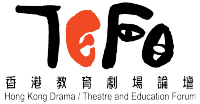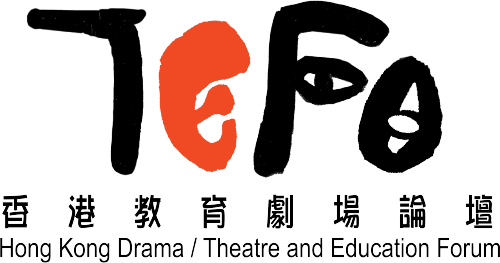Archiving and reporting on the arts is just as important as the execution of artistic practice by itself.
The archival and recording of theatrical work may not be a part of creating the actual work, but it makes sure that theatrical happenings live beyond their ephemerality.
Careful recording and detailed reflections are extensions of the creative process behind any performance, educational program or workshop, and can become valuable learning resources for the entire field.
At TEFO, we’ve always been thinking about how to fulfill our responsibility to develop ourselves as a networking and consulting organization for other practitioners in this field, and we hope that the principle of “Shared Knowledge” can continue carrying us forward in this work.
Thus, we are continually working to strengthen our online database’s ability to gather, organize and preserve applied theatre practice here in Hong Kong, so that our field’s research, records and archives can inspire present and future generations of applied theatre practitioners.
Please note that our English database is still under construction, and there may not be as much content as our Chinese database. For more resources, please visit the Chinese version of our website.
The Preliminary Exploration and Reflection on the Development and Execution of Drama and Creative-based Cross-disciplinary and Integrated Curriculum Design aiming at Exploring Local Culture and Art|DaTEAsia Vol. 11
This paper aims at exploring how the cross-disciplinary teachers in arts and humanities work together through discussions and workshops to design and develop the interdisciplinary place-based and art-and-humanity based courses and curriculum mainly starting from perspectives of drama education. The main objective of the project of Sailing of Art and Culture: The Fantasy Journey of Whale Islands is to cultivate the teachers’ community executed by National University of Tainan. We also hope to develop and figure out the logic and connection among these different theories involved in the new curriculum development to apply them into our course design and teaching pedagogies. These related theories include post-modern art education theories, cross-disciplinary curriculum development theories, place-based education, narrative ability research as well as inquiry-based educational pedagogy research. The paper also tries to analyze the developing and discussion process in building the two new courses by the teachers’ community. Furthermore, it aims to develop the innovative educational pedagogy and strategies to teach and evaluate students’ growth in their various narrative abilities. It also hopes to investigate the learning impact and effects of these place-based general education courses in developing the students’ creative abilities to help the local cultural and economic development for more teachers and students to adapt and learn from in the future.
Intercultural theatre approach in applied theatre: A multi-case study approach in Las Ranas and TYPT: 05
Identity is to be different from other people but that self-definition is not recognized by others all the time. Globalization and the standardization of the diversity of culture in terms of a ‘melting pot’ is a cause from concern. This research aims to explore how intercultural theatre approaches can be used in applied theatre in the community, in a diversity of cultural settings by two case studies, Case study 1 – Las Ranas in Spiral and Case study 2 – TYPT: 05 in Talawa. The research data was collected by four methods: participant and non-participant observation, semi-structured interview and questionnaire. The result will show that the participants responded positively during working with diverse cultures. There were no insurmountable obstacles or barriers between each participant with regard to cultural and language differences. While no one tradition can link all those differences, and an intercultural theatre approach could provide diverse cultures with a platform for developing an individual’s potential. That fulfills the objective of applied theatre that it raises up the awareness, and empowers the participants. In conclusion, there is an interrelationship between an intercultural theatre approach and applied theatre.
What Artistic, Pedagogic and Therapeutic Challenges can Arise with a Community Based Theatre Project?|DaTEAsia Vol. 3
This paper focuses on and discusses the strategies to solve different Artistic, Pedagogic and Therapeutic challenges in a staged musical based on local life, language and history with a diversity of people in a small town in Norway. Using a graphic model comprised of three intersecting circles, where each circle represents the Artistic, Pedagogic or Therapeutic challenge, I analyze both the overlapping and the distinct areas where these challenges occur. This analysis covers the process from the project’s inception through to the fnal performance.





